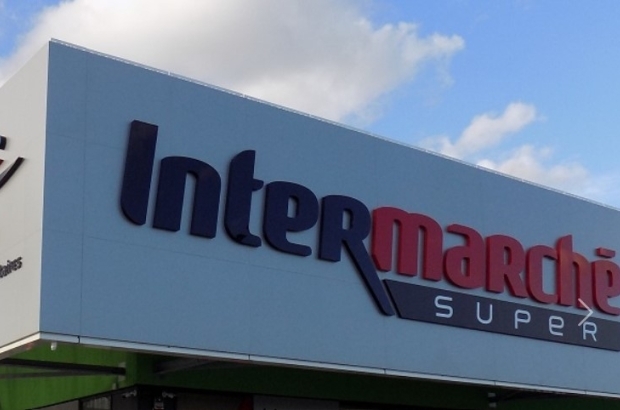- Daily & Weekly newsletters
- Buy & download The Bulletin
- Comment on our articles
Intermarché staff in Brussels go on strike after takeover
Staff at five supermarkets in Brussels that were recently taken over by French retail group Intermarché went on strike this week, in part due to language tensions.
Intermarché took over the operations of Mestdagh, a Belgian supermarket group that, until this month, ran stores in mostly Brussels and Wallonia under the Carrefour Market franchise.
“Intermarché is a French company and does not want to automatically invest in bilingualism for only the Brussels shops and two Dutch-speaking shops,” trade union CNE explained in a press release.
“As a result, workers have to print and stick labels on each Intermarché brand product, individually, and in a chaotic work environment.”
CNE said that at least 2,000 employees and 600 temporary workers were affected by the recent corporate takeover - and employees say that work has become increasingly demanding and difficult.
Five of Intermarché's eight newly acquired supermarkets in Brussels were affected by the strike - in Uccle, Forest, Schaerbeek, Molenbeek and Jette.
CNE lists several examples: “Endless queues for almost two weeks, with cash registers that are not working properly and are not sufficient; an overload of work that the company is unable to compensate for by hiring; workers who are insulted because products are missing; logistics that don’t make sense; temporary workers who try to help without being trained; a complete disorganisation of work…”
The union also said that company agreements had not been respected for months, with “too many precarious contracts, student workers and temporary workers compared to the company's permanent staff”.
But in Brussels shops, there is the added difficulty of adhering to the capital’s language laws, which stipulate that Dutch and French labels must be on all food items. The French-owned chain is not preparing to invest in helping with that, according to the CNE.
“The new management has also decided, without any consultation, to use workers from an external firm – without training and temporarily – although this work will remain recurrent until other solutions are found,” the union statement reads.
“There are so many elements that demonstrate Intermarché's lack of professionalism and consultation. The reasons for [the] strike are therefore very understandable and legitimate.
These 2,000 workers are not commodities and deserve other guarantees, other working conditions.”
Intermarché’s management said it found the strike regrettable and “understand the staff’s concerns” but that a strike is incompatible with the “dramatic” financial situation the supermarkets were in before the takeover by the French supermarket chain, Bruzz reports.
While the strikes have since ended, a mediation meeting with management was concluded without results and unions will consider further actions after another meeting on 24 January.




















Comments
Albert Heijn is not bilingual and doesn't even have a single store anywhere outside of Dutch-speaking territory. Not even in Brussels! Supposedly to avoid the cost of having to have French language food labels. Afaik, it's the same for Jumbo. But when a French company sticks with using French, suddenly employees go on strike? Why can't Belgium be like Switzerland and simply live with more than one national language? All these language disputes and language "laws" are really pathetic.
Anon3 - you seem to be answering your own (strange) observation. AH and Jumbo are not required to be bilingual. They have made an intentional decision not to operate in Brussels or Wallonie - maybe it's to avoid the cost of translation or relabeling products that are otherwise ready for sale straight off the truck. Or it's simply that the Flemish market is culturally closer in terms of brand and product preference and geographically closer with regard to distribution (parts of Flanders would actually be even easier to supply than parts of NL). Or that they are testing the waters before expanding further into Belgium.
Intermarché on the other hand have specifically decided to operate in Brussels, presumably because it's a profitable market for them - so of course they should be following the rules that exist in Brussels. It's got nothing to do with whether they're French or not, it's a case of meeting the requirements of the market they CHOOSE to operate in.